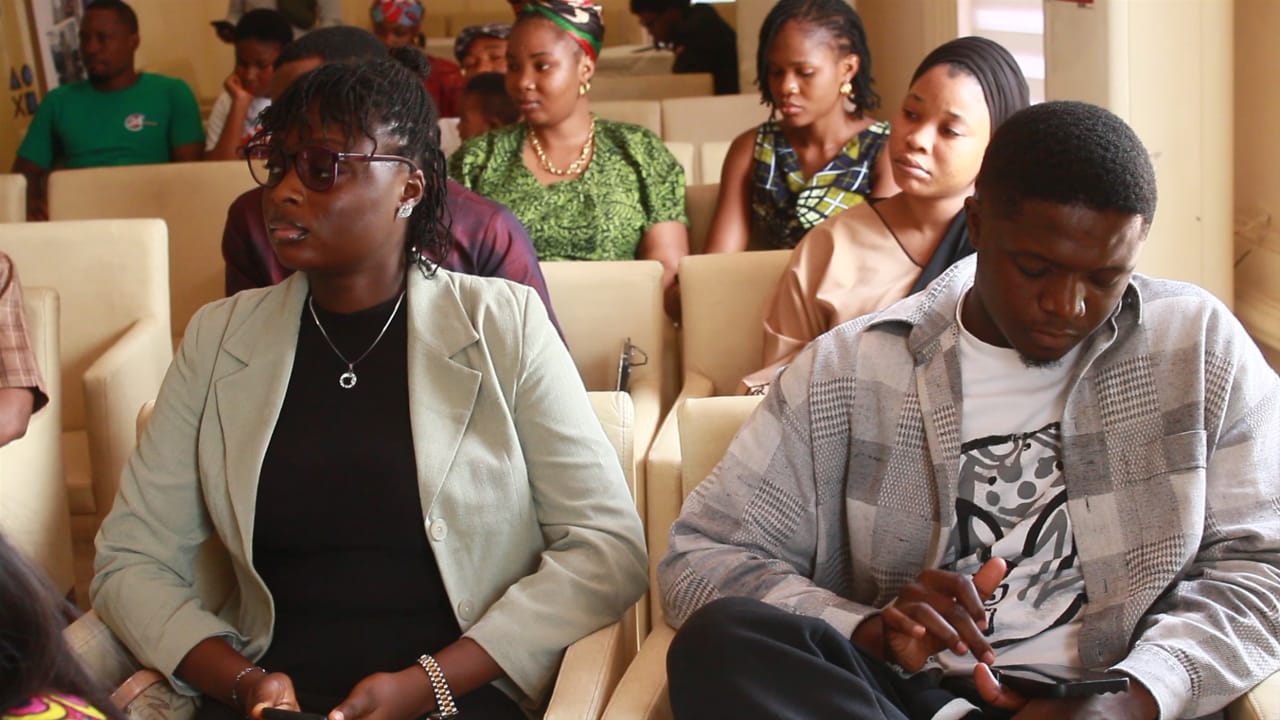News
Bridging the Digital Divide: Youth Lead the Charge on Global Accessibility Awareness Day

Joel Ajayi
Young innovators have emphasized the need for improved connectivity as a crucial tool in bridging the information gap that hinders sustainable development, particularly in underserved communities. This call to action was a central theme at the Global Accessibility Awareness Day (GAAD) event, held under the theme “Accessible by Design: Inclusion Starts Here.”
The event brought together tech entrepreneurs, policy advocates, and communication experts to discuss the digital divide and the role of innovation in promoting inclusivity across Nigeria. The highlight of the day was a panel discussion where speakers identified a lack of awareness, poor infrastructure, and limited access to digital resources as major challenges confronting youth-led innovation in the country.
Speaking at the event, Asma’u Abdullahi, convener of the program and Executive Director of Slumtech—a FinTech organization focused on developing sustainable technologies for urban low-income communities—stressed the need for a more enabling environment for young innovators to thrive.
“This is an avenue for everyone in the FinTech sector to thrive, connect, and explore opportunities,” she said. “We put a lot into organizing this—bringing together resource persons and creating platforms for knowledge-sharing. Beyond this conference, we’ve planned courses and clubs to continue mentoring them. Through Slumtech, we are breaking barriers and serving as a buffer, especially for those in rural communities who lack access to connectivity. The government can’t do it all alone. We’re stepping in to provide the basics and support young people, especially young women, in accessing the opportunities they deserve.”
Abdullahi also encouraged more female participation in tech, urging young girls to seize available opportunities, emphasizing that the digital economy must be inclusive and empowering for all.
Eric Obianozie, founder of 24 Telemed, a healthcare startup offering telemedicine services to remote communities, echoed similar sentiments. He commended the initiative, noting how programs like GAAD could help dismantle barriers and demystify technology for people in underserved regions.
“When we launched 24 Telemed in Anambra and Kaduna, we encountered serious resistance,” Obianozie recounted. “Many people weren’t familiar with technology and didn’t trust virtual consultations. It was a shock to see how much skepticism there was. But with programs like this, I’m hopeful that young people—especially those in rural areas—will begin to see digital tools not as foreign, but as gateways to better healthcare, education, and economic empowerment. Globalization has put knowledge at our fingertips, and we must harness it.”
Also lending his voice was Jakpo Ukueku, CEO of Rayven Strategic Communication Limited, a firm that provides marketing and communication strategy for organizations. He pointed out that lack of access to information remains one of the most pressing issues stifling innovation in Nigeria.
“There’s a serious knowledge gap in Nigeria,” Ukueku said. “A lot of people in the tech space are not just held back by infrastructure but by a lack of information. What we’re trying to do through conferences like this is to shorten that gap, promote strategic partnerships, and encourage sponsorship. We can’t keep relying on the government. The private sector has a huge role to play in promoting inclusivity and technological advancement.”
this event further underscores a growing commitment among stakeholders to use innovation as a force for social good. With voices like Abdullahi, Obianozie, and Ukueku leading the charge, the message is clear: access, awareness, and collaboration are the keys to bridging the digital divide and ensuring that no one is left behind in the age of globalization.
News
Amb Lion Ogorry Files Landmark Lawsuit Against Sahara Reporters, Sowore For Misleading and Malicious Publication Endangering National Security

Ambassador Adebayo Lion Ogorry, a renowned public advocacy practitioner and activist, today announced the filing of a high-profile lawsuit against Sahara Reporters Ltd. and its publisher, Omoyele Sowore, in the High Court of the Federal Capital Territory, Abuja.
The suit, numbered FCT/HC/CV/4767/2025, accuses the defendants of publishing a false, malicious, and reckless article that violates Nigeria’s Constitution, the Cybercrimes (Prohibition, Prevention, Etc.) Act 2015, and other laws protecting public discourse, national security, and public order.
The originating summons, filed on November 24, 2025, stems from a Sahara Reporters article titled
“EXCLUSIVE: How Tinubu’s Defence Minister Matawalle Maintains Contact With Bandit Leaders, Ordered Them To Compel Communities To Vote For APC—Former Aide,” published on November 19, 2025.
Ambassador Ogorry alleges that the publication contains grave, unfounded accusations against the Honourable Minister of State for Defence, Dr. Bello Matawalle, claiming he maintains illicit contacts with bandit leaders, orders communities to vote for the All Progressives Congress (APC), and engages in activities that undermine counter-terrorism efforts.
These claims, according to the suit, are not only false but also fabricated to incite alarm, hatred, and ill-will, while endangering national security and public safety.
In his affidavit supporting the summons, Ambassador Ogorry, a Nigerian citizen and resident of Abuja with a long-standing commitment to public order and lawful civic discourse, emphasized that the article was disseminated widely across Sahara Reporters’ website, social media channels, X.com (Twitter) account, Facebook pages, WhatsApp broadcasts, and other platforms. He described the publication as a blatant violation of Section 39(3)(a) of the 1999 Constitution (as amended), which prohibits speech that endangers public safety, national security, and public order. Furthermore, it contravenes Sections 24(1)(a) & (b) of the Cybercrimes Act 2015 by disseminating false, misleading, and harmful information capable of causing alarm or ill-will.
“The defendants’ reckless actions have not only tarnished the reputation of a dedicated public servant but have also compromised ongoing military operations against banditry and terrorism in Nigeria’s North-West region,” said Ambassador Ogorry. “This publication promotes distrust, exposes the Minister to risks, and undermines the morale of our armed forces engaged in counter-terrorism. It is a direct assault on our national security and the freedom of expression that must be balanced with responsibility.”
The lawsuit seeks the following reliefs from the court:
– A declaration that the publication is false, misleading, malicious, and not protected speech under Section 39(1) of the Constitution (as amended).
– A declaration that it falls within restricted speech under Section 39(3)(a), endangering public safety, national security, and public order.
– A declaration that it violates Sections 24(1)(a) & (b) of the Cybercrimes Act 2015 by prohibiting false, harmful, or misleading information.
– AN ORDER OF INJUNCTION restraining the Defendants, their agents, or privies from further publishing, distributing, circulating, or causing to be circulated the said false publication or any other malicious publication especially as it relates to and against the person of Defence Minister, Dr. Matawalle.
– An order directing the defendants to issue a public retraction of the publication and publish a full apology on their website and social media channels for 14 consecutive days.
– General and exemplary damages of N10,000,000,000 (Ten Billion Naira) for the frivolous, false, and malicious publication geared toward endangering public safety, national security, and public order.
Ambassador Ogorry highlighted that the article, based on unverified claims from an alleged “former senior aide,” lacks any official record or evidence, demonstrating the defendants’ disregard for truth and ethical journalism. He urged the court to address this as a matter of urgent national importance, citing precedents such as President F.R.N. v. ISA (2017) and Guardian Newspapers v. AIEH (2011), which affirm that freedom of expression does not protect reckless publications that threaten security.
“This lawsuit is not just about correcting a falsehood; it’s about safeguarding Nigeria’s democracy, protecting public officials from baseless attacks, and ensuring media accountability,” Ambassador Ogorry added. “Sahara Reporters and Omoyele Sowore must be held responsible for their role in spreading dangerous misinformation that could fuel terrorism and disrupt public order.”
The case is set for hearing in the Abuja Judicial Division, and Ambassador Ogorry expressed confidence in the judiciary’s ability to uphold justice and constitutional principles.
About Ambassador Adebayo Lion Ogorry
Ambassador Adebayo Lion Ogorry is a public advocacy practitioner, activist, and Nigerian citizen dedicated to promoting national security, public order, and lawful civic discourse. With a focus on protecting public discourse from malicious interference, he advocates for responsible journalism and governance.
-

 Featured6 years ago
Featured6 years agoLampard Names New Chelsea Manager
-

 Featured6 years ago
Featured6 years agoFG To Extends Lockdown In FCT, Lagos Ogun states For 7days
-

 Featured6 years ago
Featured6 years agoChildren Custody: Court Adjourns Mike Ezuruonye, Wife’s Case To April 7
-

 Featured6 years ago
Featured6 years agoNYSC Dismisses Report Of DG’s Plan To Islamize Benue Orientation Camp
-

 Featured4 years ago
Featured4 years agoTransfer Saga: How Mikel Obi Refused to compensate me After I Linked Him Worth $4m Deal In Kuwait SC – Okafor
-
Sports3 years ago
TINUBU LAMBAST DELE MOMODU
-

 News11 months ago
News11 months agoZulu to Super Eagles B team, President Tinubu is happy with you
-
Featured6 years ago
Board urges FG to establish one-stop rehabilitation centres in 6 geopolitical zones
